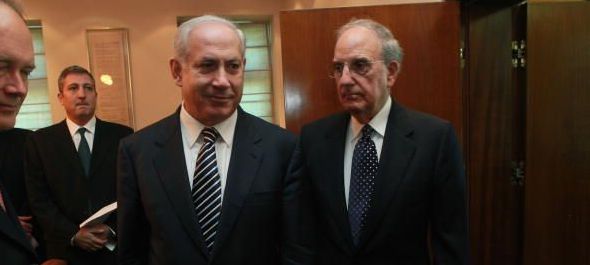
Alastair Crooke writes:
A ‘peace process’ that, from its inception, took Israel’s self-definition of its own security needs as the sole determinate of the walls within which any solution for Palestinians was to be conducted, has reached exhaustion. Based on such a reductive premise, its arrival at this deathly nadir, with no more than a prospect of disjointed alleviated occupation, possessing the most hollow trappings of statehood as its final security-led outcome, should evoke no surprise.
The non-solution to which such a premise would take us would defuse nothing: indeed, it might well prove to be the spark that could exacerbate or explode simmering regional animosities — even if these animosities were not ostensibly linked directly to the Palestinian issue.
Any thought that such a hollowed-out solution — alleviated occupation, posing as statehood — will defuse anti-American sentiment in the Muslim world is likely to prove to be resoundingly misplaced. On this, the critics from the political Right are correct: a flawed Israeli-Palestinian agreement, per se, will not drain-off anti-western regional sentiment; it will exacerbate it. It will feed it. But the corollary the Right pushes in its place, that defeating Iran somehow precisely is that elusive magic bullet the West so ardently desires (the key to soothing regional tensions and defusing hostility towards the West) represents an even greater pathology and disassociation from reality. It is one that is no less illusory for having the apparent endorsement of America’s Arab clients, whose talk is no more than a reflection back into the looking-glass of American diplomacy, as it stares at its own face.
What these American protégés really fear is the growing groundswell of scorn — scorn towards the western élites on whom these interlocutors wholly depend — but more precisely it is fear of the parallel disdain, directed towards these pro-American, self-enriching élites, themselves. Any show of western muscularity indirectly gives these anxious oligarchs, feeling their authority decay beneath them, a further lease on survival. Thus they speak their deeper fears into the American looking-glass in its own thinking. All these worrying, popular stirrings can only be Iranian: for they fear they carry the gene of revolution.
The peace process solution-phantasm has not only divided the Palestinians; but also shaped the political structure for the region for the last decades: polarizing the region — on the false premise — between those who were ‘opposed’ to peace and those who ‘supported’ peace. Many of those who were termed opposed to peace in reality were opposed more to Israel’s self-referencing security-led paradigm — than to a peaceful solution per se.
Contrary to general western expectations, there will be many in the region who welcome evidence of the clinical death of ‘the process’. They will see its passing away as a welcome and necessary catharsis that opens new possibilities; new politics. Already the polarized cold war architecture of the peace process has begun to dissolve: Turkey’s shift of orientation is one example of the shifts taking place — as the former regional division into two sculptural solids, spoilers versus supporters of peace, melts into a much more fluid and mobile regional mass. [Continue reading]


More countries are joining the international community (Not the nternational community Obama and Clinton refer to: USA/UK/Israel) and recognising the Palestinian State whithin the 1967 borers.
It is a long road, but Israel will not prevail.
I’ve been waiting a long time for someone to take on the EU for its spinelessness. The EU is as bad as Canada when it comes to outsourcing their foreign policy to Washington–which itself appears to outsource its foreign policy to Tel Aviv.
The EU has been making noises for some time led by Lady Ashton.but they haven’t actually done anything yet.
There is always tough talk then Israel starts talking, then they back down.
Beats the hell out of me why.
If I were President of the US Israel would have already been put back behind their original UN granted parcel, complete with checkpoints and a fence to protect their neighbors from them.
I wonder if the Israeli plan “B” is just using the “BOMB”? Aren’t they planning to war on Syria for some reason or other?